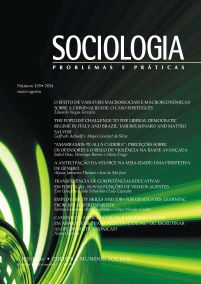The effect of macrosocial and macroeconomic variables on criminality: the case of Portugal
DOI:
https://doi.org/10.7458/SPP202410532733Keywords:
macrosocial variables, macroeconomic variables, criminality, PortugalAbstract
This study analysed the effect of variations in income and inequality of income distribution, relative and severe poverty, academic qualifications,employment by occupation, concentration of the population in urban areas, ageing population, incidence of drug use and immigration on 11 groups of crimes in Portugal. The results showed the effects of academic qualifications on crimes against property, life and physical integrity and driving offences and the effects of gross domestic product per resident, the average age of the population, occupation, urbanisation, inequality in the distribution of income and immigration.
Downloads
Published
2024-07-16
Issue
Section
Articles
License
Authors who publish in this Journal must agree the following terms and conditions:
- Authors retain copyright and grant the Journal the right to first publication, while simultaneously agreeing to a Creative Commons Attribution License, which allows others to share their work on condition that they cite the original author(s) and recognise that the latter’s work was first published in this Journal.
- Authors are authorised to enter into additional contracts separately, for non-exclusive distribution of the version of the work that is published in this Journal (e.g. publication in an institutional repository or as a book chapter), subject to recognition of initial publication in this Journal.



